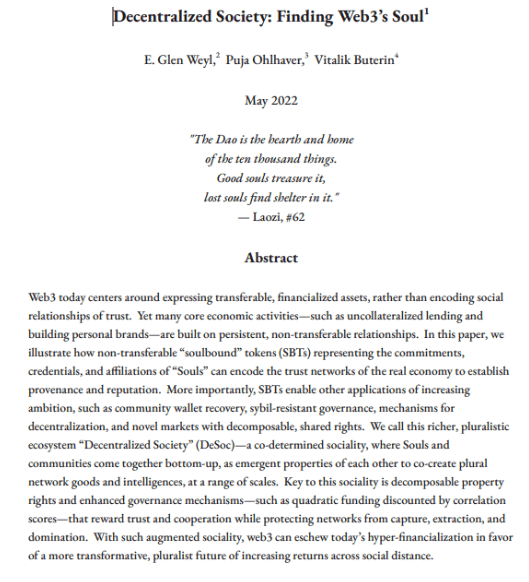Soulbound Tokens: Non-Transferable NFTs
Learn about soulbound tokens, non-transferrable type of tokens that use cases in creating records of a person’s information and achievements.

Subscribe to our newsletter!
- Soulbound Tokens (SBT) are non-transferable identity and reputation tokens that represent traits, achievements, or credentials of an individual, organization, or entity, and are stored in wallets called “Soul.”
- SBTs can be used for various purposes such as proof of personal information, academic achievements, government-issued certifications and IDs, health records, employment history, risk profiling, voting power in decentralized autonomous organizations, event tickets, games, and tournaments.
After Yield Guild Games (YGG) successfully raised $13.8 million in tokens to a group of investors led by DWF Labs and a16z Crypto, the guild’s co-founder, Gabby Dizon, announced that the funds raised will be used to expand YGG’s guild advancement program via Soulbound Reputation Tokens (SBTs).
What are Soulbound Tokens?
Basically, SBTs are non-transferable identity and reputation tokens. These are digital identity tokens that represent the traits, characteristics, achievements, or even credentials of a person, organization, or entity, allowing individuals to authenticate their personal information, including their education, work history, credit score, medical history, and professional certifications, using blockchain technology.
SBTs are in the form of a non-fungible token (NFT). However, unlike regular NFTs that can be sold or transferred to other wallets, SBTs are permanent, non-transferable NFTs. This just means that SBTs are permanently tied to a specific person, organization, or identity.
This kind of NFT was first introduced by Vitalik Buterin, the co-founder of Ethereum; Puja Ohlhaver, a lawyer; and E. Glen Weyl, an economist and social technologist. In their whitepaper called “Decentralized Society: Finding Web3’s Soul,” the three expressed that they wanted to witness projects and use cases focusing on social identities and communities rather than just money, which requires blockchains to be at the core of collaborative and fascinating ecosystems. This is where the concept of Soulbound Tokens began.

What are the Use Cases of SBTs?
These SBTs can be stored in wallets called “Soul.” This is where the use cases of this project can be seen because a person, organization, or entity can have multiple Soul wallets, depending on the category of information that will be stored:
- Personal Information: Basic personal information, including full name, birthdate, birthplace, and even hobbies and talents can be represented by SBTs. SBTs can function as proof of basic information.
- Academic Achievements: One of the most important files that a person should have is proof of educational attainment. Academic institutions can issue primary, secondary, and tertiary diplomas, special awards, transcript of records, and other academic-related achievements in the form of SBTs. SBTs can also be used as proof of attendance for daily class sessions. SBTs can function as proof of education.
- Government-Issued Certifications and IDs: Part of an adulting life is to acquire government-issued IDs that will certify one’s identity. Local governments can issue birth certificates, marriage certificates, National IDs, Philhealth IDs, and other primary and secondary IDs in the form of SBTs. SBTS can function as proof of identity.
- Health Records: Another thing that SBTs can help is the medical records, especially when one switches doctors or facilities due to different conditions. It can also verify the dates of each visit. SBTs can function as valid medical records.
- Employment History: In real life, employers do not only look at an individual’s academic achievements but also job experiences. SBTs can represent professional certificates, proof of passing a licensure exam, and others. SBTs can function as proof of skill certificate.
- Risk Profiling: SBTs could also be used as a tracker, similar to traditional bank credit scores, to determine a person or an organization’s risk profile. SBTs can function as a tracker of an entity’s DeFi borrowing history.
- Web3 DAOs: For decentralized autonomous organizations (DAOs) voting, SBTs can be used as the voting power instead of the current system, which is based on the number of tokens a member holds. With this, DAOs could issue SBTs that have equivalent voting power based on a member’s interaction with the community, activeness, and other qualifications. SBTs can function as a privilege in DAOs.
- Event Tickets: NFT tickets are gaining the attention of web3 community recently, this is where SBTs can function. There could be SBTs that can function as tickets for events, especially for multi-day or regular events happening. For example, the Beer, Bitcoin, and Bitstories event, a monthly event of Draper Startup House with an entrance fee of ₱100.00. Draper can soon offer SBTs that will function as lifelong entrance tickets to every BBB event.
- Games: SBTs are not limited to personal in-real-life certification. It can also be earned when a specific task is completed in a video game, where instead of earning an in-game token, players could also earn SBTs for them to have a list of their achievements in playing games in the form of an NFT. For instance, aside from AXS rewards, Sky Mavis could give SBTs as recognition to Axie Infinity: Origins’ top players at the end of the season. SBTs can function as certifications for in-game rewards and achievements.
- Tournaments: SBTs can also be earned when a player wins a tournament. For example, an Axie Infinity tournament could give the champion and the runners-up SBTs to represent the players’ victory, aside from AXS rewards and physical tokens. SBTs can function as someone’s hard work and determination.
Trivia: Did you know that there are claims that the term “soulbound” originated from the phrase “it is permanently bound to your soul?”
Are there Negative Sides to Using SBTs?
In their whitepaper, the three authors admitted that “a database of SBTs could provide a way to automate red-lining of disfavored social groups or even target them for cyber or physical attack, enforce restrictive migration policies, or make predatory loans.”
Others also claim that individuals with SBTs in the future could be discriminated, such as being denied to enter facilities, denied medical care, refused travel permits, having their voting rights revoked, and more.
This could be among the reasons the three authors advised SBT users to “have a way to discard or hide their SBTs if needed.”
SBTs in Today’s Era
In August 2022, Glen Weyl revealed that early use cases of SBTs could be witnessed at the end of 2022.
One of the known use cases of SBTs is Binance Account Bound (BAB), Binance’s own soulbound token. It is non-transferable, has no monetary value, and is the first-ever SBT issued on the BN Chain. According to Binance, BAB’s goal is to tackle identity verification issues in Web3, serving as a digital verification tool for Binance users who have completed the KYC requirement.
This article is published on BitPinas: Exploring Soulbound Tokens: A Breakdown of Non-Transferable NFTs
Disclaimer: BitPinas articles and its external content are not financial advice. The team serves to deliver independent, unbiased news to provide information for Philippine-crypto and beyond.




![[Live - Day 2] Bataan Global Blockchain Summit - October 27, 2022 7 [Live – Day 2] Bataan Global Blockchain Summit – October 27, 2022](https://bitpinas.com/wp-content/uploads/2022/10/Rectangle-Photo-Posts-19-768x432.png)